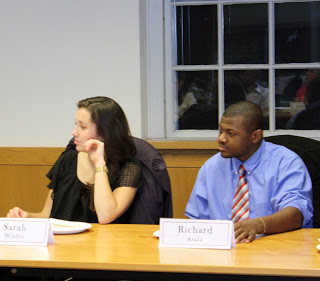- Public Policy
- Leadership
- Funding
- News & Events
- About the Center
Back to Top Nav
Back to Top Nav
Back to Top Nav
Back to Top Nav

Alison Fragale's session focused on the importance of delegation. Fragale defined delegation as a shift in decision-making authority from one level of hierarchy to another. A counter example to delegation would be micromanagement. Fragale emphasized that delegation is critical to being a leader in any capacity. At some point, managers must cease to do the work themselves and become executives who see that the work is done. “Arrivers” make the transition.
The biggest barrier to delegation can often be the leader him or herself. Thoughts such as ‘it’s quicker to do things myself’, ‘my subordinates are already overworked’ and ‘no one can do it better than me’ may be a common mindset among leaders. Such a mindset can lead to ‘reverse delegation’ i.e. delegation upward in the hierarchy, from subordinate to superior (also known as ‘passing the monkey’).
After speaking briefly about the ‘spiral of despair’ that arises from being underutilized, we talked about the EPO model, which encompasses the three components under the managements control to affect the followers’ motivation, Effort - Performance - Outcomes. Before someone becomes motivated to complete a task, they first go through the following thought process; if I put forth the effort, will I succeed in meeting expectations? If I meet expectations will I be rewarded? Do I value the outcome (reward)? If the answer to any one of the three elements is no, motivation to complete the task dramatically reduces.
Fragale engaged the participants in a very interesting exercise when she held up a dollar bill and stated that whoever was able to grab the dollar bill first could have it. Only two participants tried to play the challenge. Seeing the lack of enthusiasm for the dollar bill from the participants, Fragale explained that ‘EPO is in the eye of the beholder’.
Fragale ended the session telling us to "Fear the Monkey" and if we ever find ourselves in an authoritative position, she told us, "do what you do best, delegate the rest".
Alison Fragale, Ph.D. graduated from Dartmouth College in 1997, earning degrees in Mathematics and Economics. She began her career as a management consultant for McKinsey & Company, Inc., where she advised organizations in the automotive and financial services industries. She left McKinsey to pursue her Ph.D. in Organizational Behavior (with a focus in Social Psychology) at Stanford University's Graduate School of Business. She is currently an Associate Professor of Organizational Behavior and Strategy at the University of North Carolina's Kenan-Flagler Business School where she teaches courses on effective leadership and management to undergraduates, MBAs, and executives. Her research focuses on the consequences and formation of interpersonal hierarchies in groups and organizations, with an emphasis on the factors that cause individuals to be perceived as leaders by their groups, with a specific focus on how perceptions of leadership are affected by the leader's communication style. Fragale also serves as a member of the Rockefeller Center Board of Visitors.